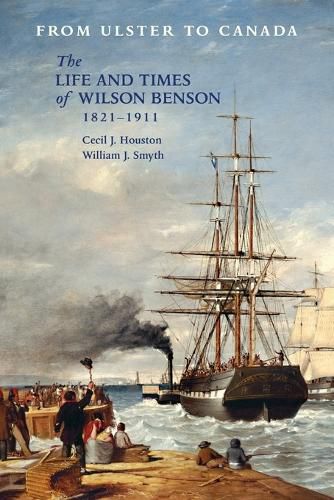Readings Newsletter
Become a Readings Member to make your shopping experience even easier.
Sign in or sign up for free!
You’re not far away from qualifying for FREE standard shipping within Australia
You’ve qualified for FREE standard shipping within Australia
The cart is loading…






This title is printed to order. This book may have been self-published. If so, we cannot guarantee the quality of the content. In the main most books will have gone through the editing process however some may not. We therefore suggest that you be aware of this before ordering this book. If in doubt check either the author or publisher’s details as we are unable to accept any returns unless they are faulty. Please contact us if you have any questions.
Canada is as much a nation of immigrants as the United States. And what is the link between this, the second largest country in the world, and the province of Ulster? No Country contributed more to the establishment of Canada than Ireland. And of the 500,000 souls who arrived there in a constant stream in the generation before the Great Famine, the vast majority originated in Ulster. Canadian identity continues to be characterised by this significant Ulster cultural contribution. In Ontario particularly, the Ulster presence was evident throughout a broad swathe of land stretching almost 1,000 kilometres from the Quebec border to the USA frontier at Detroit. These two great stories, Of Ulster migration to and settlement in Canada, unfold intriguingly in this scholarly and accessible book. Recently-married Wilson Benson emigrated from Co. Armagh in 1841, lived for another 70 years in Ontario and left behind a detailed autobiography. It recalls, firstly, his youth in Ulster and goes on to narrate in engaging detail his varied and indomitable attempts to establish himself in his New World, and absorbing tale that amply informs our understanding of the nineteenth-century migration experience. Wilson Benson's perceptive life history is of value not only to emigrant and family historians but is also a near-unique account of both Ulster society on the cusp of the trauma of the Famine and the emergence of early modern Canada
$9.00 standard shipping within Australia
FREE standard shipping within Australia for orders over $100.00
Express & International shipping calculated at checkout
This title is printed to order. This book may have been self-published. If so, we cannot guarantee the quality of the content. In the main most books will have gone through the editing process however some may not. We therefore suggest that you be aware of this before ordering this book. If in doubt check either the author or publisher’s details as we are unable to accept any returns unless they are faulty. Please contact us if you have any questions.
Canada is as much a nation of immigrants as the United States. And what is the link between this, the second largest country in the world, and the province of Ulster? No Country contributed more to the establishment of Canada than Ireland. And of the 500,000 souls who arrived there in a constant stream in the generation before the Great Famine, the vast majority originated in Ulster. Canadian identity continues to be characterised by this significant Ulster cultural contribution. In Ontario particularly, the Ulster presence was evident throughout a broad swathe of land stretching almost 1,000 kilometres from the Quebec border to the USA frontier at Detroit. These two great stories, Of Ulster migration to and settlement in Canada, unfold intriguingly in this scholarly and accessible book. Recently-married Wilson Benson emigrated from Co. Armagh in 1841, lived for another 70 years in Ontario and left behind a detailed autobiography. It recalls, firstly, his youth in Ulster and goes on to narrate in engaging detail his varied and indomitable attempts to establish himself in his New World, and absorbing tale that amply informs our understanding of the nineteenth-century migration experience. Wilson Benson's perceptive life history is of value not only to emigrant and family historians but is also a near-unique account of both Ulster society on the cusp of the trauma of the Famine and the emergence of early modern Canada